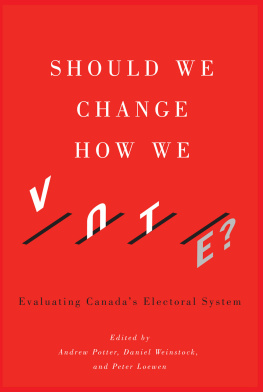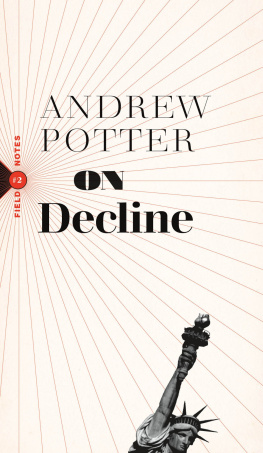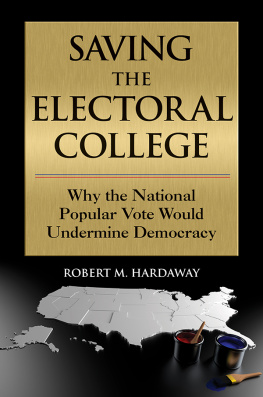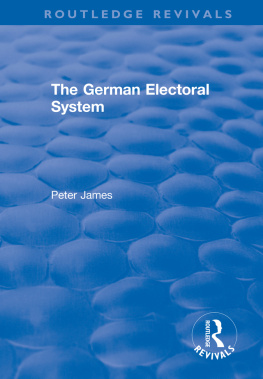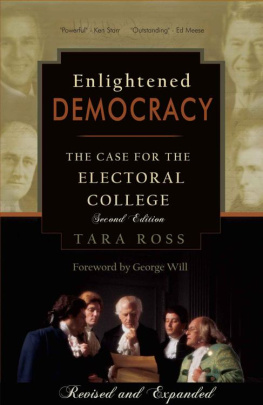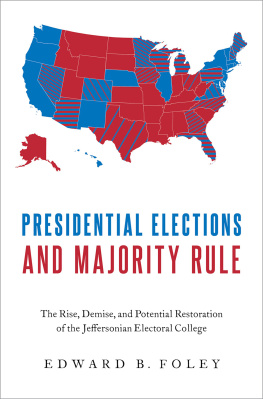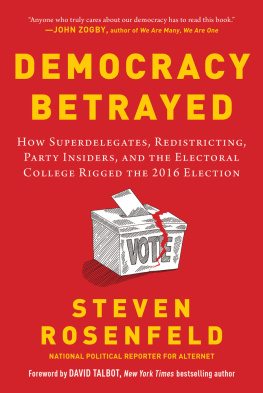
SHOULD WE CHANGE HOW WE VOTE?
Should We Change How We Vote?
Evaluating Canadas Electoral System
Edited by
ANDREW POTTER, DANIEL WEINSTOCK, AND PETER LOEWEN
Published for the McGill Institute
for the Study of Canada
by
McGill-Queens University Press
Montreal & Kingston London Chicago
McGill-Queens University Press 2017
ISBN 978-0-7735-5062-9 (cloth)
ISBN 978-0-7735-4882-4 (paperback)
ISBN 978-0-7735-5082-7 (ePDF)
ISBN 978-0-7735-5083-4 (ePUB)
Legal deposit third quarter 2017
Bibliothque nationale du Qubec
Printed in Canada on acid-free paper that is 100% ancient forest free (100% post-consumer recycled), processed chlorine free
McGill-Queens University Press acknowledges the support of the Canada Council for the Arts for our publishing program. We also acknowledge the financial support of the Government of Canada through the Canada Book Fund for our publishing activities.
Library and Archives Canada Cataloguing in Publication
Should we change how we vote? : evaluating Canadas electoral system / edited by Andrew Potter, Daniel Weinstock, and Peter Loewen.
Published for the McGill Institute for the Study of Canada.
Includes bibliographical references.
Issued in print and electronic formats.
ISBN 978-0-7735-5062-9 (hardcover). ISBN 978-0-7735-4882-4 (softcover). ISBN 978-0-7735-5082-7 (ePDF). ISBN 978-0-7735-5083-4 (ePUB)
1. Voting Canada. 2. Elections Canada. 3. Canada. Parliament Elections. 4. Proportional representation Canada. 5. Representative government and representation Canada. 6. Election law Canada. I. Potter, Andrew, editor II. Weinstock, Daniel, 1963, editor III. Loewen, Peter John, 1979, editor IV. McGill Institute for the Study of Canada, issuing body
JL193.S5 2017 | 324.630971 | C2017-900223-6 |
C2017-900224-4 |
This book was typeset in Minion.
Contents
Ken Carty
Daniel Weinstock
Peter Loewen
Emmett Macfarlane
Christopher Cochrane
Elizabeth Goodyear-Grant
William Cross
Colin M. Macleod
Mark E. Warren
Lydia Miljan
Erin Tolley
Melissa S. Williams
Angelia Wagner and Elisabeth Gidengil
Keith Archer
Dominique Leydet
Hoi L. Kong
Arash Abizadeh
Acknowledgments
This book is the result of a collaboration between the McGill Institute for the Study of Canada, the School of Public Policy and Governance at the University of Toronto, and the James McGill Professor Chair in Law at McGill University. It was conceived in response to Prime Minister Justin Trudeaus promise that the 2015 federal election campaign would be the last one held under Canadas first-past-the-post electoral system.
The papers in this collection are largely the proceedings of two conferences we organized in fall 2016. The first was held in Ottawa on October 28; the second, in Montreal on November 1. One exception is the paper by Ken Carty, who was unable to attend either conference. Instead, he submitted his paper in advance as a target paper, giving some historical context to guide conference participants in formulating their arguments.
We are grateful to David Lametti, the Liberal member of Parliament for LasallemardVerdun, who was the parliamentary sponsor for the Ottawa conference. We would also like to thank the journalists who served as panel moderators, including Paul Wells, Heather Scoffield, Kate Heartfield, Martin Patriquin, and Celine Cooper. We would also like to thank the staff at MISC, Adriana Goreta and Mercedes Taboada, Mr. Lamettis assistant, Gillian Nycum, as well as Jesse Hartery and Dorinne Ah-Kam for their work organizing the events.
We are very grateful to Natalie Blachere of McGill-Queens University Press for her enthusiasm and patience. Julie Pattee gave the contributions a helpful first read, while Kelly Hope did an outstanding job on the manuscript.
Finally, our deepest appreciation to our sponsors: the Donner Foundation, the Faculty of Law at McGill University, the Dean of Arts Development Fund at McGill University, the Macnaughton Lecture Fund, the Faculty of Law, McGill University, and the Research Group on Constitutional Studies, McGill University.
Preface
The subject of this collection of papers is an intriguing one, and it is one that is extremely important to all Canadians. While it is useful to compare electoral systems, we should avoid copying other systems or making a change for the sake of change. In my view, the citizens of each nation should adopt a voting system that is unique, and which serves the particular values and makeup of their society.
The way Canadians vote in the future will have a major impact on the character of our country. We should have a voting system that reflects our values and our priorities, as well as who we are as a people. If we decide that this requires changing how we vote, then we should proceed, but with caution. On the other hand, if we conclude that the current system serves our purposes, we should keep it.
Charles Bronfman
Introduction: The History and Politics of Electoral Reform
The Electoral Reform Process Thus Far
In June 2016, with his party languishing in third place in the polls and a general election looming, Justin Trudeau released a thirty-two-point plan aimed at restoring democracy in Canada. At the heart of that plan was a bold some would have said foolhardy commitment to changing Canadas electoral system. He pledged that, if his party was elected, the 2015 election would be the last in Canadas history to be run under the first-past-the-post system. Specifically, the party dedicated itself to striking an all-party committee that would report to Parliament, so as to allow legislation on electoral reform to be tabled within eighteen months of its accession to power.
As we all know, the Trudeau Liberals climbed from (almost) worst to first in a matter of weeks, and were elected to a majority government on October 19, 2015. This placed the new government up against a tight electoral reform agenda. When Trudeau first presented the Liberals electoral reform platform plank, Chief Electoral Officer Marc Mayrand warned that legislation would have to be in place in time to provide Elections Canada with two years in which to reorganize the institutional infrastructure on the basis of which elections occur in Canada. May 2017 was put forward as a deadline beyond which it would be difficult for Elections Canada to deal with the reforms that the legislation would set in motion.
From the beginning, the governments approach differed from recent attempts at electoral reform at the provincial level. In British Columbia and Ontario, the government had convened citizens assemblies and tasked them with proposing new electoral systems. These quasi-randomly selected assemblies then had their recommendations put to referendums held parallel to elections. British Columbia held two referendums in successive elections (2005 and 2009). The first achieved majority support for reform but not the super-majority required by the government. The second referendum failed. In Ontario, a sole referendum on reform held in 2007 also failed. Likewise, a proposal for electoral reform in PEI the result of a special committee and then a legislative committee failed in 2005. More recently, however, a plebiscite on electoral reform resulted in a public preference for reform. Whether reform is to be implemented remains an open question. In New Brunswick and Quebec, extensive consultations and draft legislation never successfully passed either legislature.
Next page
